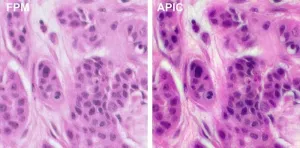(Press-News.org) Chicago (June 29, 2024) — People with higher intakes of calcium and zinc in the three months before they conceived were significantly less likely to suffer hypertensive disorders during their pregnancy compared with those who had lower intakes of these essential minerals, according to new research.
The results highlight the importance of focusing on nutrition before conceiving — not only during pregnancy — in order to promote healthy pregnancies.
“Our findings underscore the significance of preconception dietary intake of calcium and zinc in potentially reducing the risk of hypertensive disorders of pregnancy,” said Liping Lu, MD, PhD, who conducted the research as a postdoctoral research scientist at Columbia University and is now an assistant professor at Ball State University. “Higher intakes of zinc and calcium before conception, derived from diet and supplements, are both associated with a lower risk of hypertensive disorders during pregnancy.”
Lu will present the findings at NUTRITION 2024, the flagship annual meeting of the American Society for Nutrition held June 29–July 2 in Chicago.
Hypertension, or high blood pressure, is one of the most common disorders of pregnancy and can harm both the pregnant person and the developing fetus. Considering the potential adverse effects of antihypertensive medications during pregnancy, researchers have focused on opportunities to prevent dangerous hypertension-related disorders such as pre-eclampsia through modifiable factors like nutrition.
While many people begin focusing on their nutrition after becoming pregnant, the researchers said that a person’s nutritional status before conception is important since it can often take time for the body to correct deficiencies or imbalances.
“The health of women during the preconception period is strongly linked to the pregnancy outcome,” Lu said. “Adequate nutrient or mineral stores in the body prior to conception can ensure optimal nutrient status for conception and support the early stages of fetal growth and development.”
The researchers conducted two separate studies using data from over 7,700 pregnant women across the U.S. who provided information about their health and diet through a study called the Nulliparous Pregnancy Outcomes Study: Monitoring Mothers-To-Be. One study focused on calcium while the other focused on zinc. The researchers analyzed the association between pre-conception intakes of each mineral and rates of hypertensive disorders of pregnancy after accounting for demographic, lifestyle and health factors that are also related to the risk of hypertension.
The results showed that people in the highest quintile for pre-conception calcium intake were 24% less likely to experience hypertensive disorders during pregnancy compared with those in the lowest quintile. For zinc, participants were divided into quartiles and those with the highest pre-conception zinc intakes were 38% less likely to experience hypertensive disorders during pregnancy than those with the lowest zinc intakes.
As observational studies, Lu noted that the results do not necessarily prove causation. However, the findings align with other studies that have linked higher intakes of the two minerals with a lower risk of hypertension-related diseases outside of pregnancy. In addition, calcium and zinc are both known to play important roles in metabolic processes related to maintaining the health of blood vessels, providing a plausible biological explanation for the notion that these minerals could help to prevent blood pressure disorders.
Recommendations of the National Academies of Sciences, Engineering, and Medicine suggest that women of childbearing age should consume 1,000 milligrams of calcium and 8 milligrams of zinc daily.
Lu will present this research at 3:24-3:36 p.m. CDT on Saturday, June 29, during the Dietary Micronutrient and Supplementation in Population session in McCormick Place (abstract; presentation details) and at 4:00-4:12 p.m. CDT on Monday, July 1, during the Nutrient Status and Supplementation in Life's Beginnings session in McCormick Place (abstract; presentation details).
This release may include updated numbers or data that differ from those in the submitted abstract.
Please note that abstracts presented at NUTRITION 2024 were evaluated and selected by a committee of experts but have not generally undergone the same peer review process required for publication in a scientific journal. As such, the findings presented should be considered preliminary until a peer-reviewed publication is available.
About NUTRITION 2024
NUTRITION 2024 is the flagship meeting of the American Society for Nutrition and the premier educational event for nutritional professionals around the globe. NUTRITION brings together lab scientists, practicing clinicians, population health researchers, and community intervention investigators to identify solutions to today’s greatest nutrition challenges. Our audience also includes rising leaders in the field – undergraduate, graduate, and medical students. NUTRITION 2024 will be held June 29–July 2, 2024 in Chicago. https://nutrition.org/N24 #Nutrition2024
About the American Society for Nutrition (ASN)
ASN is the preeminent professional organization for nutrition research scientists and clinicians around the world. Founded in 1928, the society brings together the top nutrition researchers, medical practitioners, policy makers and industry leaders to advance our knowledge and application of nutrition. ASN publishes four peer-reviewed journals and provides education and professional development opportunities to advance nutrition research, practice, and education. Since 2018, the American Society of Nutrition has presented NUTRITION, the leading global annual meeting for nutrition professionals. http://www.nutrition.org
Find more news briefs from NUTRITION 2024 at: https://www.eurekalert.org/newsroom/nutrition2024/home.
###
END
About The Study: The results of this survey study indicated that 6 months into unwinding, 1 in 8 Medicaid beneficiaries reported exiting the program, with wide state variation. Roughly half who lost Medicaid coverage became uninsured. Among those moving to new coverage, many experienced coverage gaps. Adults exiting Medicaid reported more challenges accessing care than respondents who remained enrolled.
Corresponding Author: To contact the corresponding author, Adrianna McIntyre, Ph.D., M.P.H., M.P.P., email amcintyre@hsph.harvard.edu.
To access the embargoed study: Visit our For The Media website at this link https://media.jamanetwork.com/
(doi:10.1001/jamahealthforum.2024.2193)
Editor’s ...
Embargoed for release: Saturday, June 29, 2:15 PM ET
Key points:
In a survey of low-income adults across Arkansas, Kentucky, Louisiana, and Texas, one in eight respondents who were enrolled in Medicaid at some point since March 2020—when COVID-19-era coverage protections began—reported no longer having Medicaid coverage by late 2023, months after protections expired and “Medicaid unwinding” began.
Nearly half of those who were disenrolled from Medicaid reported being uninsured in late 2023, and those who lost Medicaid ...
Chicago (June 29, 2024) — A study performed in mice has uncovered a potential new tool to combat the escalating issue of childhood obesity. The research suggests that a simple dietary change, in the form of a fish oil supplement taken by fathers, might help address this pressing health concern.
The number of young people ages 5 to 19 who are obese has risen from 31 million in 1990 to 160 million in 2022, according to the World Health Organization. This extra weight can increase the risk of diabetes, high blood pressure and high cholesterol and may also lead to poor self-esteem ...
New York, NY – June 28, 2024—Kyowa Hakko Bio Co., Ltd. and Kirin Holdings Company, Limited are thrilled to announce their sponsored satellite program at the American Society for Nutrition's (ASN) Annual Conference, NUTRITION 2024. This groundbreaking session will spotlight the neuroprotective effects of citicoline, revealing its potential to enhance cognitive function and combat brain aging.
Attendees will gain an in-depth understanding of how citicoline works at a cellular level, positively impacting brain health. This program will use advanced scientific techniques to examine its effects on neurons, astrocytes, ...
UCSF-led study alerts transwomen and physicians to interpret standard screening guidelines with caution.
Transgender women on hormone therapy tend to skew artificially low on prostate cancer screening tests, which may give false reassurance and delay diagnosis and treatment, reports a new study led by UC San Francisco.
The researchers found that transwomen scored 50 times lower than typical PSA tests (prostate-specific antigen), the gold standard tool to detect prostate cancer. This could mean that current “normal” thresholds are too high for transgender women, and their cancer might not be found until a later ...
The official opening ceremony of FAPESP Week China was held on Friday (June 28) in the city of Dongguan, Guangdong Province. Organized in partnership with the China-Lac Technology Transfer Center (CLTTC), the event brought together political, diplomatic and academic leaders from both countries and also marked the start of the Conference on Technology Exchange and Development of China-Latin America Cooperation.
“On behalf of the Department of International Cooperation of the Ministry of Science and Technology of the People’s Republic of China, I welcome the guests and congratulate the organizers. All friends who share the same mission are not separated by geographical ...
A loss of salt and body fluid can stimulate kidney regeneration and repair in mice, according to a NIH-funded study led by USC Stem Cell scientist Janos Peti-Peterdi and published in The Journal of Clinical Investigation. This innate regenerative response relies on a small population of kidney cells in a region known as the macula densa (MD), which senses salt and exerts control over filtration, hormone secretion, and other key functions of this vital organ.
“Our personal and professional mission is to find a cure for kidney disease, a growing global epidemic affecting one out of seven adults, which translates ...
A team of researchers from Ochsner Health recently published an insightful article in the International Forum of Allergy & Rhinology exploring the application of convolutional neural networks (CNNs) to improve the accuracy and efficiency of nasal endoscopy. The study, authored by resident physician Dr. Vinayak Ganeshan under the guidance of senior otolaryngologist Dr. Edward D. McCoul, addresses the challenges posed by the intricate nasal cavity anatomy in rhinology diagnostics.
Nasal endoscopy (NE) is an essential diagnostic tool in rhinology, but its effectiveness can be hampered by the complex ...
Scientists and kiaʻi loko (fishpond practitioners) have a new tool to aid their efforts to restore and ensure the resilience of Native Hawaiian fishponds. Researchers from the University of Hawai‘i (UH) and fishpond stewards in Hilo, Hawai‘i recently published a study in the Journal of Remote Sensing highlighting the use of uncrewed aerial vehicles (UAVs) to support integrated coastal zone management, including at cultural heritage sites.
“We discovered that drones are effective and cost-efficient ...
For hundreds of years, the clarity and magnification of microscopes were ultimately limited by the physical properties of their optical lenses. Microscope makers pushed those boundaries by making increasingly complicated and expensive stacks of lens elements. Still, scientists had to decide between high resolution and a small field of view on the one hand or low resolution and a large field of view on the other.
In 2013, a team of Caltech engineers introduced a microscopy technique called FPM (for ...






